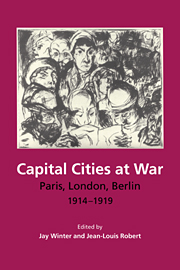Book contents
- Frontmatter
- Contents
- Note on joint authorship
- List of figures
- List of tables
- Part 1 Premises
- Part 2 The Social Relations of Sacrifice
- 3 Lost generations: the impact of military casualities on Paris, London, and Berlin
- 4 The image of the profiteere
- Part 3 The social relations of labour
- Part 4 The social relations of incomes
- Part 5 The social relations of consumption
- Part 6 Urban demography in wartime
- Part 7 Towards a social history of capital cities at war
- Statistical appendix and tables
- Bibliography
- Index
3 - Lost generations: the impact of military casualities on Paris, London, and Berlin
Published online by Cambridge University Press: 15 December 2009
- Frontmatter
- Contents
- Note on joint authorship
- List of figures
- List of tables
- Part 1 Premises
- Part 2 The Social Relations of Sacrifice
- 3 Lost generations: the impact of military casualities on Paris, London, and Berlin
- 4 The image of the profiteere
- Part 3 The social relations of labour
- Part 4 The social relations of incomes
- Part 5 The social relations of consumption
- Part 6 Urban demography in wartime
- Part 7 Towards a social history of capital cities at war
- Statistical appendix and tables
- Bibliography
- Index
Summary
For communities at war, military casualties predominate. The fundamental reality is loss of life and limb. All other considerations are secondary. If communities are viewed as the sphere in which the distribution of privileges and goods is negotiated through legal and political channels, then no decision is as important as the one which determines who will live and who will die violently. Those who volunteer or who are conscripted and lay down their lives for the common good become the moral touchstone by which others are judged. Death in war stands as the counterpoint to the pursuit of self-interest, the antithesis of shirking, hoarding, and profiteering. The death of the soldier or sailor is the exemplary sacrifice which has the moral power to evoke material sacrifice. The needs of ‘total war’ subverted the dominant idea of political economy, the idea that the common good was served by the pursuit of self-interest. In its place it resurrected new forms of older ideals, those of Christian martyrdom and ‘republican’ civic humanism in which self-interest was contrasted to the common good.
The particular communities studied here occupied a unique place in their societies, aspects of which were described in chapter 2. When discussing casualties, the first question is whether or not the three capitals' inhabitants suffered military losses to a similar degree and in a similar chronological rhythm as did the nation as a whole.
- Type
- Chapter
- Information
- Capital Cities at WarParis, London, Berlin 1914–1919, pp. 57 - 103Publisher: Cambridge University PressPrint publication year: 1997
- 3
- Cited by

